Bradley Byrne: Choosing greatness
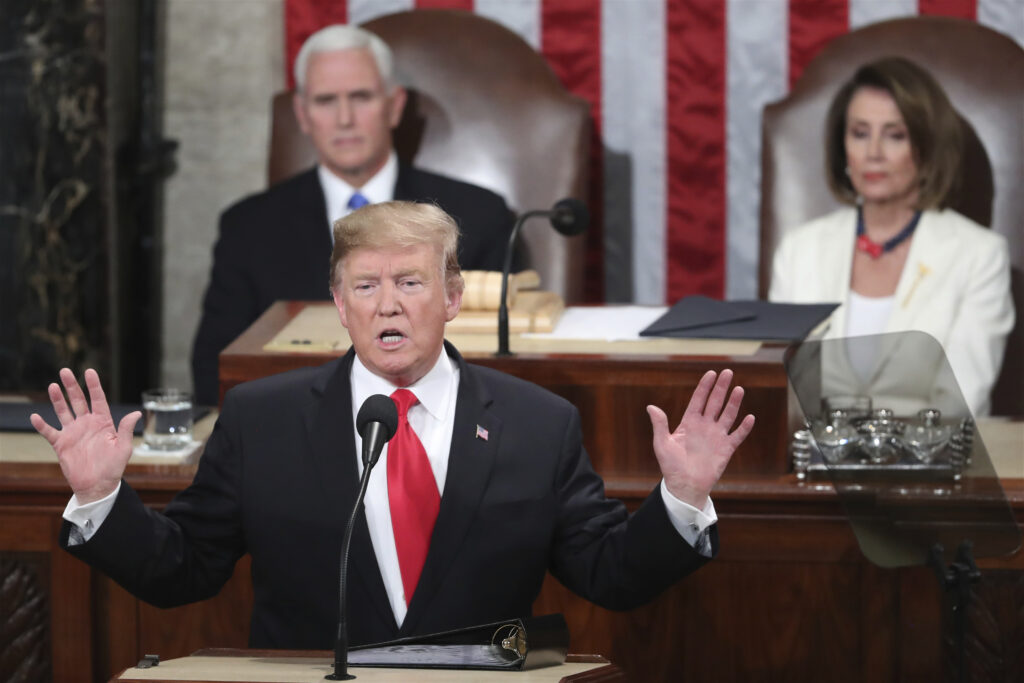
Last week, President Donald Trump gave the State of the Union address to the nation. I can say that in all my time in Washington, this was the best State of the Union I have had the honor of attending, and it seems most Americans agree. The President’s message was clear: if we stop with the political games and focus on solutions, American Greatness knows no bounds. By supporting President Trump’s clear and bold agenda, the American people will be stronger, safer, and more prosperous. He began by charging us to choose greatness in all that we do as lawmakers and as Americans. The guests the President and First Lady invited to the speech – including war heroes of World War II, relatives of victims of illegal immigration, and those who suffered from drug abuse – were expertly woven throughout the address to demonstrate the greatness that resides in our country. It takes these reminders of our greatness to underscore the need to come together to work on issues that matter most to the American people. Most notably, President Trump again outlined a commonsense strategy to secure our border. After decades of inaction by both parties, it is time we finally fix our broken immigration system, restore the rule of law, and keep the American people safe. He also outlined many issues important to Alabama. From strengthening our military to expanding rural broadband to lowering prescription drug costs, under President Trump’s agenda the people of Alabama stand to benefit, and our state will become even stronger. I appreciated the President’s call to rebuild American infrastructure. As we know in Alabama, the need for a stronger infrastructure system is vitally important to the overall success of our economy. With better roads, bridges, and waterways, we can unlock the extraordinary potential of our economic future. Rural broadband access is something that folks throughout the state will benefit from. People in rural areas deserve the same economic opportunities as those in urban areas when it comes to Internet access, and I will continue to advocate for greater access to rural broadband in any infrastructure bill put forward by Congress. Similarly, President Trump is dedicated to the American workforce, something Congress echoed last year through a number of laws to protect workers and. In the same vein, as the President mentioned, lowering the cost of healthcare and prescription drugs will benefit our workforce as well. With month after month of continued growth and positive economic news, it is clear that our conservative policies continue to pay off. I was thrilled President Trump mentioned the importance of protecting the unborn in his speech. As he said, “Let us reaffirm a fundamental truth: all children — born and unborn — are made in the holy image of God.” I couldn’t agree more. Lastly, President Trump’s call for protecting America’s national security in conjunction with safe and legal immigration is a commonsense approach we as a nation can get behind. Border security is national security. It only makes sense that we should advocate for greater national security and strong borders. Recently, Democrats have obstructed what is best for the American people: opposing border security measures, supporting infanticide, and proposing ill-thought-out and costly plans for our environment. It is time to stop with the politics of resistance and instead focus on realistic solutions to the problems facing our country. President Trump is right when he said that great bipartisan achievements in this Congress are possible, especially when we rally behind a commonsense agenda building American Greatness. Let’s get it done. • • • Bradley Byrne is a member of U.S. Congress representing Alabama’s 1st Congressional District.
Martha Roby: Reflecting on the President’s State of the Union and pro-life call to action

Every year, the State of the Union address provides an important opportunity for the sitting President to speak directly to Congress and the American people and offer an update on his priorities and plans to accomplish them. I recently attended President Trump’s second State of the Union address, and I was glad to hear what he had to say. In this year’s State of the Union address, President Donald Trump highlighted the economic success hardworking Americans are experiencing thanks to the implementation of pro-growth policies, including the historic tax reform overhaul. I was also pleased to hear more about his plans to work with Congress to secure our border, reinvigorate our badly aging infrastructure, strengthen our military, bolster our national security efforts, improve care for veterans, and defend the unborn. The last item on that list has received a lot of attention lately due to the heartbreaking news that has come out of New York and Virginia in recent weeks. If you’ve not heard, the legislature in the State of New York recently cheered loudly upon their passage of a bill that would significantly loosen restrictions on late-term abortions. In Virginia, the Democratic Governor Ralph Northam is facing severe backlash over his support for a similar state measure. He said: “Third trimester abortions are done in cases where there may be severe deformities… If a mother is in labor, I can tell you exactly what would happen. The infant would be delivered. The infant would be kept comfortable. The infant would be resuscitated if that’s what the mother and the family desired.” These comments are a horrific defense of born-alive abortions – infanticide. No matter your position on abortion generally, I hope we can all agree that if an abortion fails and a child is born alive, the child must be given the same care that any other living, breathing infant would otherwise be given. I truly never dreamt I would see the day America would have government officials who openly support legal infanticide. It is stunning, appalling, and heartbreaking. During this challenging time for the pro-life movement in this country, I am very glad that President Trump utilized his platform during the State of the Union address to offer a call to action: We must put legal protections in place for babies who are born alive during botched abortions. I remain unapologetically pro-life. I believe life begins at conception and am opposed to abortion at any stage. I understand that not everyone shares my views, but still, I am severely disturbed that this country now requires written legal provisions to protect a living baby. Sadly, in the aftermath of the news coming out of New York and Virginia, it is clear that this step is immediately necessary. In the House, Republicans wasted no time in responding to the President’s demand for action. Two of my colleagues in particular, Congressman Steve Scalise from Louisiana, who is our House Minority Whip, and Congresswoman Ann Wagner of Missouri, are leading efforts to force a vote on the Born-Alive Abortion Survivors Protection Act, a bill I cosponsor that would protect babies who are born alive during abortion procedures. I cannot express how strongly I support this commonsense measure, and I cannot fathom how any person would oppose it. We must swiftly advance legal protections for these newborns and punish any doctor who allows an infant to die. I also support our Republican leadership’s efforts to quickly bring up a vote on this legislation. Every single member of Congress should be forced to vote either for or against infanticide. The American people deserve to know where each of us stands on this humanitarian issue. The challenges we face with a divided Congress have been made abundantly clear. I was encouraged by President Trump’s remarks during his State of the Union address, and I was especially glad that he stood in strong defense of the unborn and rallied our pro-life community to action. I am eager to continue working with his Administration and my colleagues in Congress to deliver results on this important issue and others. The American people and Alabama’s Second District deserve nothing less. ••• Martha Roby represents Alabama’s Second District. She lives in Montgomery, Alabama, with her husband Riley and their two children.
5 takeaways from Donald Trump’s State of the Union speech
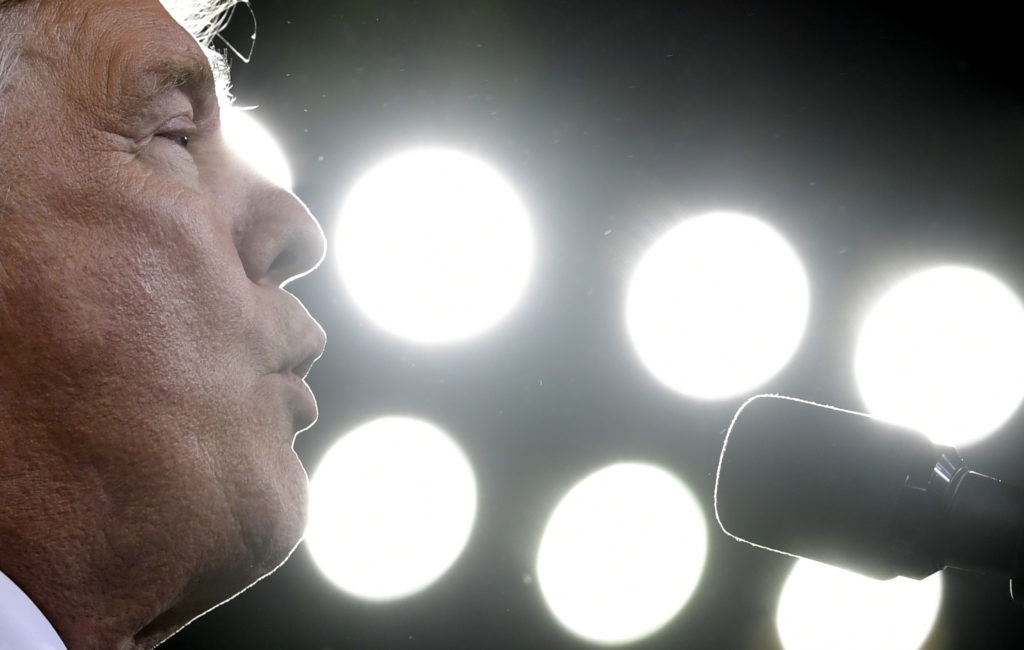
President Donald Trump delivered his second State of the Union speech Tuesday night, calling on Democrats and Republicans to work together and making only brief reference to the rancor that has dominated his presidency. Five key takeaways from his remarks: HE’S NOT BUDGING ON THE WALL “I will get it built,” he declared in his Tuesday evening speech. Addressing a joint session of lawmakers, Trump yet again hammered his now-familiar case for building a wall along the U.S.-Mexico border, insisting the situation represents a crisis that demands a physical barrier. But the president outlined no plan or new strategy for convincing Congress to approve money to build the wall. He issued a broad call for all sides to “work together, compromise, and reach a deal that will truly make America safe.” Trump notably made no reference to his continued to threat to circumvent Congress by declaring a national emergency if lawmakers refuse to give him the billions of dollars he’s demanding. The White Housed decided the speech was an inappropriate venue for such an announcement, especially after Trump said he’d allow congressional negotiators to run out a three-week clock that expires on Feb. 15 before taking any action. He has all but dismissed their efforts. THE HOUSE WAS IN ORDER Would they boo? Hiss? Jeer? With Democrats now in charge of the House and amid a bitter border wall battle that led to the longest government shutdown in the nation’s history, the White House was bracing for a less-than-friendly reception from those gathered in the House. Instead, the 82-minute speech was punctuated by lighthearted moments, including when lawmakers from both parties sang a spontaneous rendition of “Happy Birthday” to Judah Samet, a member of the Tree of Life Synagogue in Pittsburgh who survived a shooting that killed 11 people in October. Trump joked that the lawmakers wouldn’t break into song for him. The president also prompted cheers from the freshmen female House Democrats when he touted the number of new jobs created that women have filled. The women — dressed in white in honor of early 20th-century suffragettes — stood on their feet, with one raising her hands in the air in a “raise the roof” motion. Trump seemed taken back by the outbursts. “You weren’t supposed to do that,” he said before congratulating all the women who hold seats in Congress. The women jumped back up and high-fived each other, chanting “U-S-A!” SHUTDOWN? WHAT SHUTDOWN? Trump made no reference to the 35-day government shutdown that rocked the nation’s capital, leaving hundreds of thousands of workers without pay and freezing many government services the first month of the year. It was a notable omission from a president who had once said that he would be proud to own the shutdown — and came just 10 days before the government is set to run out of money again. Trump did note that Congress “has 10 days left to pass a bill that will fund our government, protect our homeland, and secure our southern border.” But he didn’t mention the funding deadline. It was a different story for Stacey Abrams, the Georgia Democrat who delivered her party’s response to Trump and spoke about how she’d joined volunteers to distribute meals to furloughed federal workers during the shutdown. “Making their livelihoods a pawn for political games,” she said, “is a disgrace.” AN APPEAL TO THE BASE As he does often in his toughest political moments, Trump tried to rally the Christian conservative voters who have proven to be some of his most loyal backers. He seized upon recent controversies surrounding “late-term abortions” and warned against legislation that he claimed “would allow a baby to be ripped from the mother’s womb moments before birth.” “These are living, feeling, beautiful babies who will never get the chance to share their love and dreams with the world,” he said, calling on Congress to pass legislation that would limit abortion rights. Trump also singled out embattled Democratic Virginia Gov. Ralph Northam by title, though not by name — claiming he would “execute a baby after birth.” Northam in an interview last week defended, in rare occasions, the practice of third-trimester abortions. He has since been under fire for a photograph on his medical school yearbook page featuring a person in blackface standing next to a person wearing a Ku Klux Klan outfit. He denies he’s in the photo and rejecting calls for his resignation. A FEW SWIPES AT DEMOCRATS Even as he called for a new age of bipartisanship and urged lawmakers to “govern not as two parties, but as one nation,” Trump couldn’t help but take few digs at Democrats, including the “resistance” movement in defiance of his presidency. “We must reject the politics of revenge, resistance and retribution — and embrace the boundless potential of cooperation, compromise and the common good,” Trump said at one point. Later he touted an “economic miracle” taking place across the country that he said could only be stopped by “foolish wars, politics, or ridiculous partisan investigations.” As for the new wave of socialist fervor in the Democratic Party, Trump declared, “Tonight, we renew our resolve that America will never be a socialist country.”
Donald Trump calls for end of resistance politics in State of Union
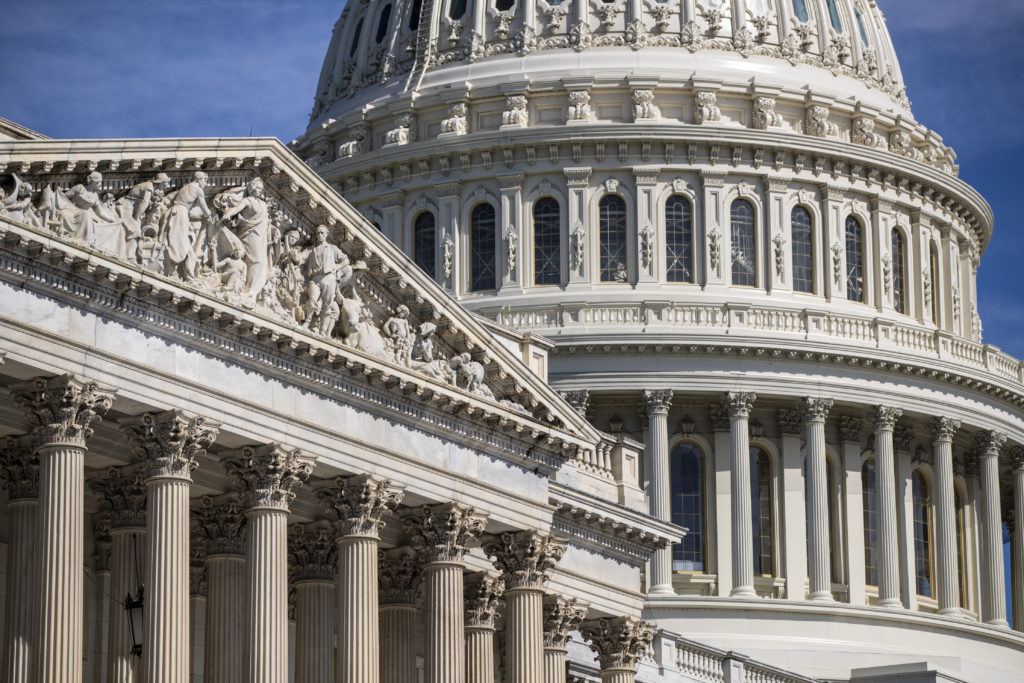
Facing a divided Congress for the first time, President Donald Trump on Tuesday called on Washington to reject “the politics of revenge, resistance and retribution.” He warned emboldened Democrats that “ridiculous partisan investigations” into his administration and businesses could hamper a surging American economy. Trump’s appeals for bipartisanship in his State of the Union address clashed with the rancorous atmosphere he has helped cultivate in the nation’s capital — as well as the desire of most Democrats to block his agenda during his next two years in office. Their opposition was on vivid display as Democratic congresswomen in the audience formed a sea of white in a nod to early 20th-century suffragettes. Trump spoke at a critical moment in his presidency, staring down a two-year stretch that will determine whether he is re-elected or leaves office in defeat. His speech sought to shore up Republican support that had eroded slightly during the recent government shutdown and previewed a fresh defense against Democrats as they ready a round of investigations into every aspect of his administration. “If there is going to be peace and legislation, there cannot be war and investigation,” he declared. Lawmakers in the cavernous House chamber sat largely silent. Looming over the president’s address was a fast-approaching Feb. 15 deadline to fund the government and avoid another shutdown. Democrats have refused to acquiesce to his demands for a border wall, and Republicans are increasingly unwilling to shut down the government to help him fulfill his signature campaign pledge. Nor does the GOP support the president’s plan to declare a national emergency if Congress won’t fund the wall. Wary of publicly highlighting those intraparty divisions, Trump made no mention of an emergency declaration in his remarks, though he did offer a lengthy defense of his call for a border wall. But he delivered no ultimatums about what it would take for him to sign legislation to keep the government open. “I am asking you to defend our very dangerous southern border out of love and devotion to our fellow citizens and to our country,” he said. Trump devoted much of his speech to foreign policy, another area where Republicans have increasingly distanced themselves from the White House. He announced details of a second meeting with North Korea’s Kim Jong Un, outlining a summit on Feb. 27 and 28 in Vietnam. The two met last summer in Singapore, though that meeting only led to a vaguely worded commitment by the North to denuclearize. As he stood before lawmakers, the president was surrounded by symbols of his emboldened political opposition. House Speaker Nancy Pelosi, who was praised by Democrats for her hard-line negotiating during the shutdown, sat behind Trump as he spoke. And several senators running for president were also in the audience, including Sens. Kamala Harris of California and Cory Booker of New Jersey. Another Democratic star, Stacey Abrams, will deliver the party’s response to Trump. Abrams narrowly lost her bid in November to become America’s first black female governor, and party leaders are aggressively recruiting her to run for U.S. Senate from Georgia. In excerpts released ahead of Abrams’ remarks, she calls the shutdown a political stunt that “defied every tenet of fairness and abandoned not just our people, but our values.” Trump’s address amounted to an opening argument for his re-election campaign. Polls show he has work to do, with his approval rating falling to just 34 percent after the shutdown, according to a recent survey conducted by The Associated Press-NORC Center for Public Affairs Research. One bright spot for the president has been the economy, which has added jobs for 100 straight months. He said the U.S. has “the hottest economy anywhere in the world.” He said, “The only thing that can stop it are foolish wars, politics or ridiculous partisan investigations” an apparent swipe at the special counsel investigation into ties between Russia and Trump’s 2016 campaign, as well as the upcoming congressional investigations. The diverse Democratic caucus, which includes a bevy of women, sat silently for much of Trump’s speech. But they leapt to their feet when he noted there are “more women in the workforce than ever before.” The increase is due to population growth — and not something Trump can credit to any of his policies. Turning to foreign policy, another area where Republicans have increasingly been willing to distance themselves from the president, Trump defended his decisions to withdraw U.S. troops from Syria and Afghanistan. “Great nations do not fight endless wars,” he said, adding that the U.S. is working with allies to “destroy the remnants” of the Islamic State group and that he has “accelerated” efforts to reach a settlement in Afghanistan. IS militants have lost territory since Trump’s surprise announcement in December that he was pulling U.S. forces out, but military officials warn the fighters could regroup within six months to a year of the Americans leaving. Several leading GOP lawmakers have sharply criticized his plans to withdraw from Syria, as well as from Afghanistan. Trump’s guests for the speech include Anna Marie Johnson, a woman whose life sentence for drug offenses was commuted by the president, and Joshua Trump, a sixth-grade student from Wilmington, Delaware, who has been bullied over his last name. They sat with first lady Melania Trump during the address. Republished with permission from the Associated Press
Alabama lawmakers, groups respond to Donald Trump’s State of the Union speech

President Donald Trump delivered his second State of the Union address Tuesday night ending with a call for unity. Here’s what Alabama lawmakers and groups had to say about the President’s address: Sen. Richard Shelby: President Trump outlined a policy agenda that both parties can work together to achieve. During his first two years in office, the President has delivered on many promises to the American people, including signing historic tax reform into law, creating one of the strongest economies I have seen in my lifetime, and focusing on vital infrastructure projects. While huge strides were made to address our nation’s most critical issues last Congress, I applaud President Trump’s dedication to solve the challenges still facing us today. It is imperative that we work to put our political disagreements aside in order to secure our borders with a comprehensive solution. As Chairman of the Appropriations Committee, I will continue to work with my colleagues on both sides of the aisle to find common ground on this critical issue. 1st District U.S. Rep. Bradley Byrne: Tonight, President Trump’s message was clear: if we stop with the political games and focus on solutions, American Greatness knows no bounds. By supporting the President’s clear and bold agenda, the American people will be stronger, safer, and more prosperous. …It is time to stop with the politics of resistance and act on these critically important issues. President Trump is right when he said that great bipartisan achievements in this Congress are possible, especially when we rally behind a commonsense agenda building American Greatness. Let’s get it done. 2nd District U.S. Rep. Martha Roby: In his second State of the Union address, President Trump highlighted the economic success hardworking Americans are experiencing thanks to the implementation of pro-growth policies, including the historic tax reform overhaul. I was also pleased to hear more about his plan to work with Congress to reinvigorate our badly aging infrastructure, strengthen our military, bolster our national security efforts, improve care for veterans, and defend the unborn. In addition, President Trump laid out his vision for our country’s future as it relates to enhancing border security and finally addressing our serious illegal immigration problem. Now, with a divided Congress, I was encouraged by his remarks about the importance of bipartisanship and working together to get our job done. I am eager to continue working with the Administration and my colleagues in Congress to deliver the results that the American people and Alabama’s Second District deserve. 3rd District U.S. Rep. Mike Rogers: Tonight, President Trump reaffirmed in his speech what makes our country great. His vision for America is attainable if we all work together and his eloquent call for unity will only make our nation stronger. I look forward to continuing to work with President Trump to build an even stronger economy, ensure our national security remains a top priority and secure our Southwest border with Mexico 4th District U.S. Rep. Robert Aderholt: As the President pointed out, the state of our Union is indeed strong. The economy is growing at an all-time high and unemployment is near record lows. And on the world stage, America is once again showing its strength. President Trump is not only working to defeat ISIS, but is also working to finally end the nuclear threat from North Korea. President Trump is getting so much pushback because he has forced Washington bureaucrats out of their comfort zone. Democrats, and even some Republicans, want to stick to the status quo, but that is not how you achieve results for all Americans. 5th District U.S. Rep. Mo Brooks: President Trump did an excellent job of explaining why we must secure America’s porous southern border. Too many Americans have lost their lives and their jobs. Too many Americans have had their wages suppressed. Too many Americans are being forced to pay higher taxes to support welfare for illegal alien families. In short, President Trump laid bare for all to see the betrayal of American families by Democrats who care more about illegal aliens than Americans. Whether the focus was on economic prosperity, free enterprise versus socialism, international relations, health care, national security, or the promise of America, President Trump hit the game-winning grand slam, shot the game-winning three point shot, and scored the game-winning touchdown. In sum, President Trump reminded us of how great America is and how proud we should be to be Americans. 6th District U.S. Rep. Gary Palmer: The President’s theme tonight of choosing greatness was what I think the nation needed to hear. He made it clear that we have a choice—we can choose to continue to pursue agendas that will weaken us, or we can choose an agenda that will unite us and ensure a bright and secure future for America. … I hope my Democratic colleagues will heed President Trump’s words tonight and return to this bipartisan approach that he has encouraged. He summed it up well tonight when he said, ‘Together, we can break decades of political stalemate. We can bridge old divisions, heal old wounds, build new coalitions, forge new solutions, and unlock the extraordinary promise of America’s future. The decision is ours to make 7th District U.S. Rep. Terri Sewell: The President’s promises of bipartisanship and unity tonight ring hollow. Actions speak louder than words. Over and over, the Trump administration has pursued divisive and destructive policies that have failed the middle class. The President has attacked people with pre-existing conditions and American’s right to health care. He has put corporate interests above those of working families by passing the GOP tax scam and denying federal workers their hard-earned paychecks during the longest government shutdown in U.S. history. Day in and day out, the President has sowed a culture of fear and falsehoods and put his own personal interests above those of the American people. Alabama Republican Party | Chairman Terry Lathan: President Trump showed true leadership through his incredible State of the Union Address. In calling for a renewal
Donald Trump calls for end of resistance politics in State of Union
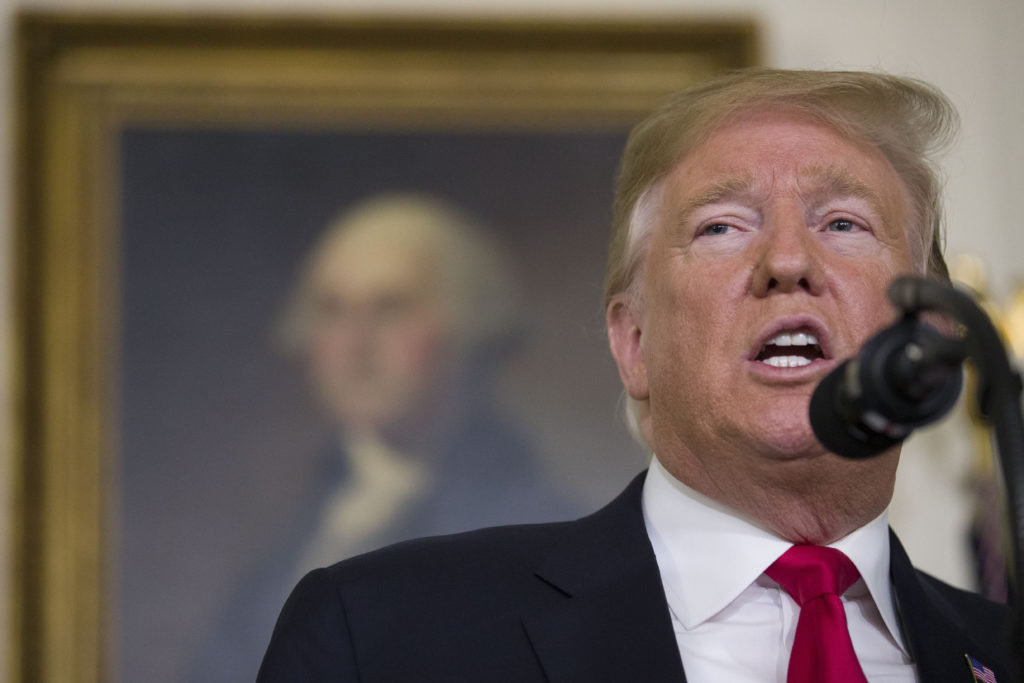
Facing a divided Congress for the first time, President Donald Trump on Tuesday called on Washington to reject “the politics of revenge, resistance and retribution.” He warned emboldened Democrats that “ridiculous partisan investigations” into his administration and businesses could hamper a surging American economy. Trump’s appeals for bipartisanship in his State of the Union address clashed with the rancorous atmosphere he has helped cultivate in the nation’s capital — as well as the desire of most Democrats to block his agenda during his next two years in office. Their opposition was on vivid display as Democratic congresswomen in the audience formed a sea of white in a nod to early 20th-century suffragettes. Trump spoke at a critical moment in his presidency, staring down a two-year stretch that will determine whether he is re-elected or leaves office in defeat. His speech sought to shore up Republican support that had eroded slightly during the recent government shutdown and previewed a fresh defense against Democrats as they ready a round of investigations into every aspect of his administration. “If there is going to be peace and legislation, there cannot be war and investigation,” he declared. Lawmakers in the cavernous House chamber sat largely silent. Looming over the president’s address was a fast-approaching Feb. 15 deadline to fund the government and avoid another shutdown. Democrats have refused to acquiesce to his demands for a border wall, and Republicans are increasingly unwilling to shut down the government to help him fulfill his signature campaign pledge. Nor does the GOP support the president’s plan to declare a national emergency if Congress won’t fund the wall. Wary of publicly highlighting those intraparty divisions, Trump made no mention of an emergency declaration in his remarks, though he did offer a lengthy defense of his call for a border wall. But he delivered no ultimatums about what it would take for him to sign legislation to keep the government open. “I am asking you to defend our very dangerous southern border out of love and devotion to our fellow citizens and to our country,” he said. Trump devoted much of his speech to foreign policy, another area where Republicans have increasingly distanced themselves from the White House. He announced details of a second meeting with North Korea’s Kim Jong Un, outlining a summit on Feb. 27 and 28 in Vietnam. The two met last summer in Singapore, though that meeting only led to a vaguely worded commitment by the North to denuclearize. As he stood before lawmakers, the president was surrounded by symbols of his emboldened political opposition. House Speaker Nancy Pelosi, who was praised by Democrats for her hard-line negotiating during the shutdown, sat behind Trump as he spoke. And several senators running for president were also in the audience, including Sens. Kamala Harris of California and Cory Booker of New Jersey. Another Democratic star, Stacey Abrams, will deliver the party’s response to Trump. Abrams narrowly lost her bid in November to become America’s first black female governor, and party leaders are aggressively recruiting her to run for U.S. Senate from Georgia. In excerpts released ahead of Abrams’ remarks, she calls the shutdown a political stunt that “defied every tenet of fairness and abandoned not just our people, but our values.” Trump’s address amounted to an opening argument for his re-election campaign. Polls show he has work to do, with his approval rating falling to just 34 percent after the shutdown, according to a recent survey conducted by The Associated Press-NORC Center for Public Affairs Research. One bright spot for the president has been the economy, which has added jobs for 100 straight months. He said the U.S. has “the hottest economy anywhere in the world.” He said, “The only thing that can stop it are foolish wars, politics or ridiculous partisan investigations” an apparent swipe at the special counsel investigation into ties between Russia and Trump’s 2016 campaign, as well as the upcoming congressional investigations. The diverse Democratic caucus, which includes a bevy of women, sat silently for much of Trump’s speech. But they leapt to their feet when he noted there are “more women in the workforce than ever before.” The increase is due to population growth — and not something Trump can credit to any of his policies. Turning to foreign policy, another area where Republicans have increasingly been willing to distance themselves from the president, Trump defended his decisions to withdraw U.S. troops from Syria and Afghanistan. “Great nations do not fight endless wars,” he said, adding that the U.S. is working with allies to “destroy the remnants” of the Islamic State group and that he has “accelerated” efforts to reach a settlement in Afghanistan. IS militants have lost territory since Trump’s surprise announcement in December that he was pulling U.S. forces out, but military officials warn the fighters could regroup within six months to a year of the Americans leaving. Several leading GOP lawmakers have sharply criticized his plans to withdraw from Syria, as well as from Afghanistan. Trump’s guests for the speech include Anna Marie Johnson, a woman whose life sentence for drug offenses was commuted by the president, and Joshua Trump, a sixth-grade student from Wilmington, Delaware, who has been bullied over his last name. They sat with first lady Melania Trump during the address. Republished with permission from the Associated Press
What to watch during Donald Trump’s State of the Union address
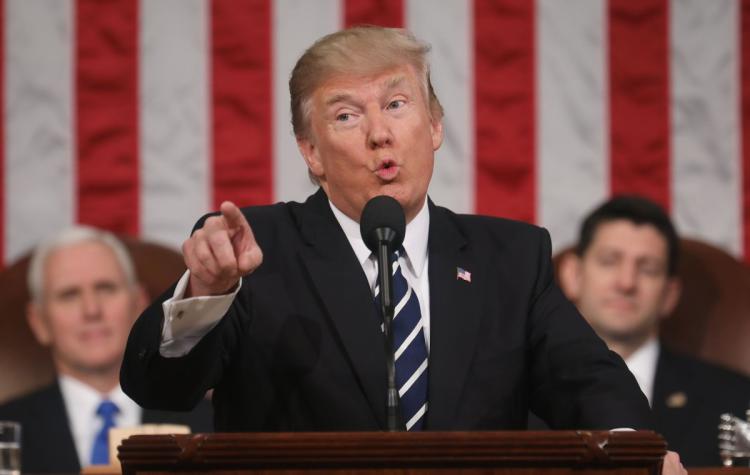
President Donald Trump, a uniter? That’s the approach advisers say Trump will take in his first State of the Union address delivered under divided government. A president who’s mocked everyone from women to the U.S. intelligence community, foreign leaders and members of Congress is expected to speak Tuesday night of setting aside hard feelings and moving forward. For an idea of how that goes over, keep an eye on House Speaker Nancy Pelosi, seated behind him and over his shoulder, and the record number of women and minorities who dot the audience after the November 2018 elections. And listen for how enthusiastically Republicans applaud Trump’s outreach. AMPED ATMOSPHERE Everything about the event, including the date, is framed by the longest government shutdown in history. Pelosi suggested Trump postpone the scheduled Jan. 29 speech until the government reopened. Trump, who commands the armed forces, then put off Pelosi’s trip overseas on a military plane. She then formally yanked the welcome mat by refusing to hold a vote to allow Trump to address a joint session of Congress. The tug of war ended Jan. 25, when Trump lifted the shutdown without getting new money for the wall he wants to build on the U.S.-Mexico border. Pelosi then re-invited Trump to deliver the address on Tuesday and he agreed. Trump has vowed to get his border wall and has threatened to declare a national emergency to pay for it without Congress’ approval. ___ TRUMP’S ENTRANCE The pomp begins the moment House Sergeant-at-Arms Paul Irving yells from the back of the chamber, “Madam Speaker, the president of the United States!” Trump will then walk down the center aisle flanked by Republican leaders, shaking hands with many of the lawmakers who grabbed seats earlier in the day in hopes of making it into photos and video with the president. Republicans will burst into raucous hoots and applause. Not likely to extend a hand to Trump: The star of the Democratic freshmen, Rep. Alexandria Ocasio-Cortez of New York. “But I’ll be there and I’ll be present to see and listen to what’s going on,” she told TMZ. ___ WHO’S IN THE ROOM It’s a rare moment when members of the three separate and co-equal branches of government meet under the same roof. The night’s key visual will be Pelosi sitting behind Trump along with Vice President Mike Pence. All 535 members of Congress are invited, along with members of Trump’s Cabinet and the justices of the Supreme Court, led by Chief Justice John Roberts. The balcony tells its own story. To the left, Trump will nod to first lady Melania Trump and the administration’s guests. Seated elsewhere in the gallery will be lawmakers’ invited guests, many chosen to send messages reinforcing each party’s agenda. This year the guests include people who have suffered because of the shutdown and those pushing for tougher immigration laws. ___ DESIGNATED SURVIVOR It’s not just a television show. By tradition, one Cabinet secretary is closeted away at a secure, undisclosed location to ensure continuity of government in case disaster strikes while government leaders attend the speech. Agriculture Secretary Sonny Perdue was last year’s “designated survivor.” But Trump’s choice this year could be limited by the number of “acting” secretaries in the Cabinet. Only Senate-confirmed secretaries (and natural-born citizens) in the line of succession to the presidency can assume control of government in a crisis. That means Acting Defense Secretary Patrick Shanahan, Acting Attorney General Matthew Whitaker, Acting Interior Secretary David Bernhardt and Transportation Secretary Elaine Chao can’t fill the role of designated survivor. Chao is a naturalized U.S. citizen who was born in Taiwan. ___ WHAT’S HAPPENING IN THE AUDIENCE Look for women on the Democratic side of the aisle wearing white, the color favored by early 20th century suffragettes and now worn by those who want Trump to easily spot his new opponents. Listen for boos, hisses or silence from the newly empowered Democratic side when Trump speaks. Note whether Trump can raise everyone’s gaze and hit feel-good themes that inspire both sides to applaud. For instance, who’s against “unity?” Both Trump and Georgia Democrat Stacey Abrams, who will deliver the rebuttal, have used that idea to preview their remarks. ___ DEMOCRATS RUNNING FOR PRESIDENT Nearly a dozen Democrats who dream of succeeding Trump serve in Congress. They will be sizing up the president and each other as well. Watch the body language among the would-be Democratic presidents: Who’s talking to whom, who gets or gives a hug or a kiss, whose heads are bowed in hushed conversation. Also watch their body language toward Trump. Cameras will be trolling the audience — and the presidential dreamers know it — to see if they can be caught responding with an eye roll or head shake. ___ ABRAMS AFTER WORDS Senate Democratic leader Chuck Schumer chose Abrams to deliver the rebuttal in a nod toward the black women who anchor the Democratic Party. Doing so elevates her among Democrats as the leaders woo Abrams to run for the Senate. Abrams also will provide a contrast with Trump, who has a history of making racially inflammatory remarks. Abrams is filling a role that for others has proven thankless and generated brutal reviews. Republican Sen. Marco Rubio’s lunge for a water bottle became a meme after he delivered his party’s response in 2013. Then-Louisiana Gov. Bobby Jindal, a Republican, was panned for being dull in 2009. Former New Jersey Gov. Chris Christie, appearing on “The Late Show with Stephen Colbert,” said he twice turned down offers to deliver the rebuttal. Why? “Because it sucks,” he said. … Follow Kellman and Superville on Twitter at twitter.com/APLaurieKellman and twitter.com/DSupervilleAP Republished with permission from the Associated Press
Terri Sewell invites widow of slain Alabama officer to attend State of the Union

The widow of a slain Alabama police officer is attending President Donald Trump’s State of the Union address as a guest of U.S. Rep. Terri Sewell. The Democratic lawmaker says Tiphanie Carter will join her at the speech Tuesday night. Carter is the wife of the late Wytasha Carter, a Birmingham police sergeant who was shot to death in the line of duty last month. Sewell tweeted Monday that Carter represents the best in her 7th District region. She says her colleagues need to hear his widow’s story to prevent gun violence. The 44-year-old Carter was killed as he and another officer investigated possible car break-ins Jan. 13. Two suspects have been arrested. Republished with permission from the Associated Press
Ending showdown with Nancy Pelosi, Donald Trump postpones State of Union
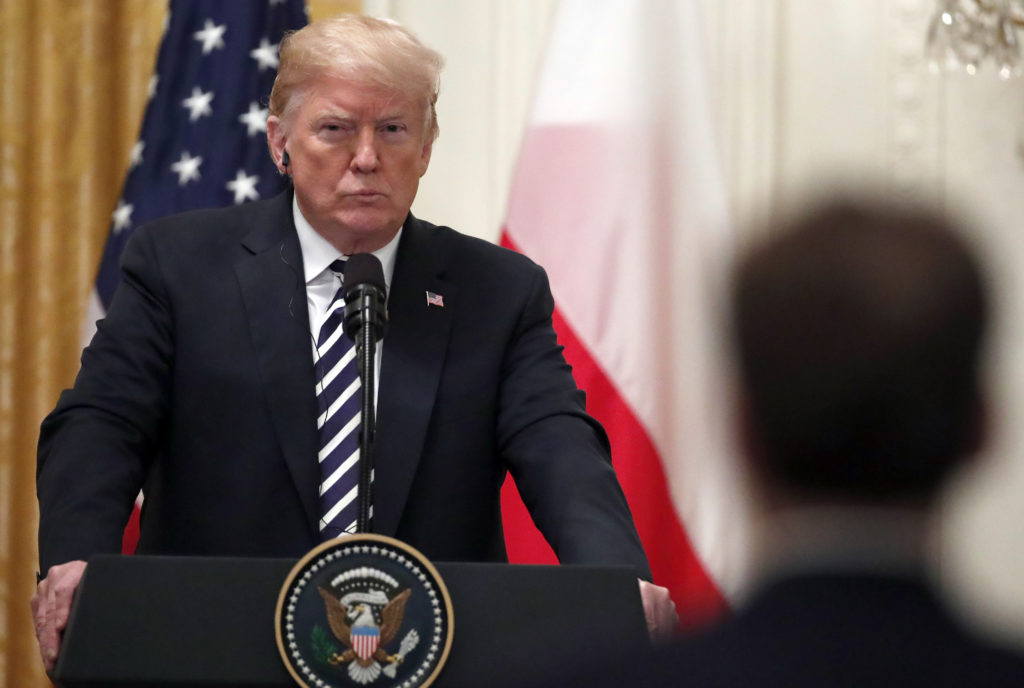
President Donald Trump said he is postponing his State of the Union address until the partial government shutdown ends, yielding after a weeklong showdown with House Speaker Nancy Pelosi. Following a high-stakes game of dare and double-dare, Trump conceded Wednesday night that “no venue that can compete with the history, tradition and importance of the House Chamber.” He said he was not looking for an alternate option after Pelosi served notice earlier in the day that he wouldn’t be allowed to deliver the address to a joint session of Congress next week. Pelosi had taken the step after Trump said he planned to show up in spite of Democratic objections to the speech taking place with large swaths of the government shut down. Denied that grand venue, Trump promised to come up with some sort of alternative event. The White House scrambled to find a site matching the gravitas of the traditional address from the rostrum of the House to lawmakers from both parties, Supreme Court justices, invited guests and a television audience of millions. “As the Shutdown was going on, Nancy Pelosi asked me to give the State of the Union Address. I agreed,” Trump tweeted shortly after 11 p.m. EST. “She then changed her mind because of the Shutdown, suggesting a later date. This is her prerogative – I will do the Address when the Shutdown is over.” Pelosi said Thursday that she was thankful the president recognized it was “inappropriate” to hold the State of the Union during the government shutdown, adding “thank goodness we put that matter to rest.” Fireworks over the speech shot back and forth between the Capitol and the White House as the monthlong partial government shutdown showed no signs of ending and about 800,000 federal workers faced the prospect of going without their second paycheck in a row come Friday. Pelosi told Trump the House wouldn’t approve a resolution allowing him to address Congress until the shutdown ended. Trump shot back that Pelosi was afraid of hearing the truth. “I think that’s a great blotch on the incredible country that we all love,” Trump said earlier Wednesday. “It’s a great, great horrible mark.” The drama surrounding the State of the Union address began last week when Pelosi asked Trump to make other plans but stopped short of denying him the chamber for his address. Trump called her bluff Wednesday in a letter, saying he intended to come anyway. “It would be so very sad for our Country if the State of the Union were not delivered on time, on schedule, and very importantly, on location,” he wrote. Pelosi quickly squelched the speech, writing back that the House “will not consider a concurrent resolution authorizing the President’s State of the Union address in the House Chamber until government has opened.” The president cannot speak in front of a joint session of Congress without both chambers’ explicit permission. A resolution needs to be approved by both chambers specifying the date and time for receiving an address from the president. The gamesmanship unfolded as the Senate prepared to vote this week on dueling proposals on the shutdown. A Republican one would give Trump money for the wall while one from Democrats would re-open government through Feb. 8, with no wall money, giving bargainers time to talk about it. Both proposals were likely to fail to reach the 60-vote threshold needed in the Senate, where Republicans hold a 53-47 majority. As well, House Democrats were putting forward a new proposal, aiming to lure Trump away from his demand for a border wall by offering billions of new dollars for other border security measures. The Constitution states only that the president “shall from time to time give to the Congress Information of the State of the Union,” meaning the president can speak anywhere he chooses or give his update in writing. The address has been delayed before. Ronald Reagan’s 1986 State of the Union address was postponed after the Challenger space shuttle exploded in flight on Jan. 28 of that year. But there is no precedent for a State of the Union invitation being rescinded. Presidents Harry Truman, Dwight Eisenhower and Jimmy Carter issued their final messages in print. As Eisenhower recovered from a heart attack in 1956, he prepared a seven-minute, filmed summary of the message from his retreat in Key West, Florida, that was broadcast nationwide. Richard Nixon sent a printed message in 1973; his staff said an oral message would have come too soon after his second inaugural address. White House officials had been working on a backup plan to have Trump give the speech somewhere else if Democrats blocked access to the House chamber. Nevertheless, they were rattled by Pelosi’s move Wednesday and expressed concern it would further sour shutdown negotiations. Pelosi said that when she extended her Jan. 3 invitation to Trump to deliver the State of the Union address on Jan. 29, there was no thought that the government would still be shut down. She wrote Wednesday: “I look forward to welcoming you to the House on a mutually agreeable date for this address when government has been opened.” Moments after her letter became public, Trump told reporters he wasn’t surprised by Pelosi’s action. Democrats have become “radicalized,” he claimed. He expanded on those sentiments during a subsequent event at the White House, calling the cancellation a “disgrace” and asserting that Pelosi didn’t want to hear the truth about the need for better border security. The White House and Democratic lawmakers have been accusing one another of pettiness since Pelosi raised doubts about the speech. Trump followed up by revoking her use of a military plane for a congressional delegation visit to Afghanistan. Republished with permission from the Associated Press.
Donald Trump, Nancy Pelosi feud heats up again
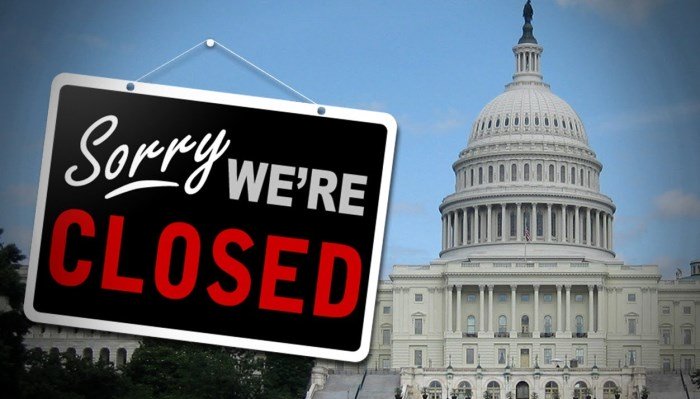
She imperiled his State of the Union address. He denied her a plane to visit troops abroad. The shutdown battle between President Donald Trump and House Speaker Nancy Pelosi is playing out as a surreal game of constitutional brinkmanship, with both flexing political powers from opposite ends of Pennsylvania Avenue as the negotiations to end the monthlong partial government shutdown remain stalled. In dramatic fashion, Trump issued a letter to Pelosi on Thursday, just before she and other lawmakers were set to depart on the previously undisclosed trip to Afghanistan and Brussels. Trump belittled the trip as a “public relations event” — even though he had just made a similar warzone stop — and said it would be best if Pelosi remained in Washington to negotiate to reopen the government. “Obviously, if you would like to make your journey by flying commercial, that would certainly be your prerogative,” wrote Trump, who had been smarting since Pelosi, the day before, called on him to postpone his Jan. 29 State of the Union address due to the shutdown. Denying military aircraft to a senior lawmaker — let alone the speaker, who is second in line to the White House, traveling to a combat region — is very rare. Lawmakers were caught off guard. A bus to ferry the legislators to their departure idled outside the Capitol on Thursday afternoon. The political tit-for-tat between Trump and Pelosi laid bare how the government-wide crisis has devolved into an intensely pointed clash between two leaders determined to prevail. It took place as hundreds of thousands of federal workers go without pay and Washington’s routine protocols — a president’s speech to Congress, a lawmaker’s official trip — became collateral damage. Pelosi spokesman Drew Hammill said the speaker planned to travel to Afghanistan and Brussels to thank service members and obtain briefings on national security and intelligence “from those on the front lines.” He noted Trump had traveled to Iraq during the shutdown, which began Dec. 22, and said a Republican-led congressional trip also had taken place. Trump’s move was the latest example of his extraordinary willingness to tether U.S. government resources to his political needs. He has publicly urged the Justice Department to investigate political opponents and threatened to cut disaster aid to Puerto Rico amid a spat with the island territory’s leaders. Some Republicans expressed frustration. Sen. Lindsey Graham tweeted, “One sophomoric response does not deserve another.” He called Pelosi’s State of the Union move “very irresponsible and blatantly political” but said Trump’s reaction was “also inappropriate.” While there were few signs of progress Thursday, Vice President Mike Pence and senior adviser Jared Kushner dashed to the Capitol late in the day for a meeting with Republican Senate Majority Leader Mitch McConnell. And the State Department instructed all U.S. diplomats in Washington and elsewhere to return to work next week with pay, saying it had found money for their salaries at least temporarily. For security reasons, Pelosi would normally make such a trip on a military aircraft supplied by the Pentagon. According to a defense official, Pelosi did request Defense Department support for overseas travel and it was initially approved. The official wasn’t authorized to speak by name about the matter, so spoke on condition of anonymity. The official said the president does have the authority to cancel the use of military aircraft. Rep. Adam Schiff of California slammed Trump for revealing the closely held travel plans. “I think the president’s decision to disclose a trip the speaker’s making to a war zone was completely and utterly irresponsible in every way,” Schiff said. Trump’s trip to Iraq after Christmas was not disclosed in advance for security reasons. White House spokeswoman Sarah Huckabee Sanders said Trump wanted Pelosi to stay in Washington before Tuesday, a deadline to prepare the next round of paychecks for federal workers. “We want to keep her in Washington,” Sanders said. “The president wants her here to negotiate.” The White House also canceled plans for a presidential delegation to travel to an economic forum in Switzerland next week, citing the shutdown. And they said future congressional trips would be postponed until the shutdown is resolved, though it was not immediately clear if any such travel — which often is not disclosed in advance — was coming up. Trump was taken by surprise by Pelosi’s move to postpone his address and told one adviser it was the sort of disruptive move he would make himself, according to a Republican who is in frequent contact with the White House and was not authorized to speak publicly about private conversations. While he maintained a public silence, Trump grew weary of how Pelosi’s move was being received on cable TV and reiterated fears that he was being outmaneuvered in the public eye. Trump was delighted at the idea of canceling Pelosi’s trip, believing the focus on the resources needed would highlight her hypocrisy for cancelling his speech, according to the Republican. Trump has still not said how he will handle Pelosi’s attempt to have him postpone his State of the Union address until the government is reopened so workers can be paid for providing security for the grand Washington tradition. Pelosi told reporters earlier Thursday: “Let’s get a date when government is open. Let’s pay the employees. Maybe he thinks it’s OK not to pay people who do work. I don’t.” Trump declined to address the stalemate over the speech during a visit Thursday to the Pentagon, simply promising that the nation will have “powerful, strong border security.” Pelosi reiterated she is willing to negotiate money for border security once the government is reopened, but she said Democrats remain opposed to Trump’s long-promised wall. “I’m not for a wall,” Pelosi said twice, mouthing the statement a third time for effect. The shutdown, the longest ever, entered its 28th day on Friday. The previous longest was 21 days in 1995-96, under President Bill Clinton. In a notice to staff, the State Department said it can pay
Mo Brooks proposes State of the Union be moved to Senate Chamber
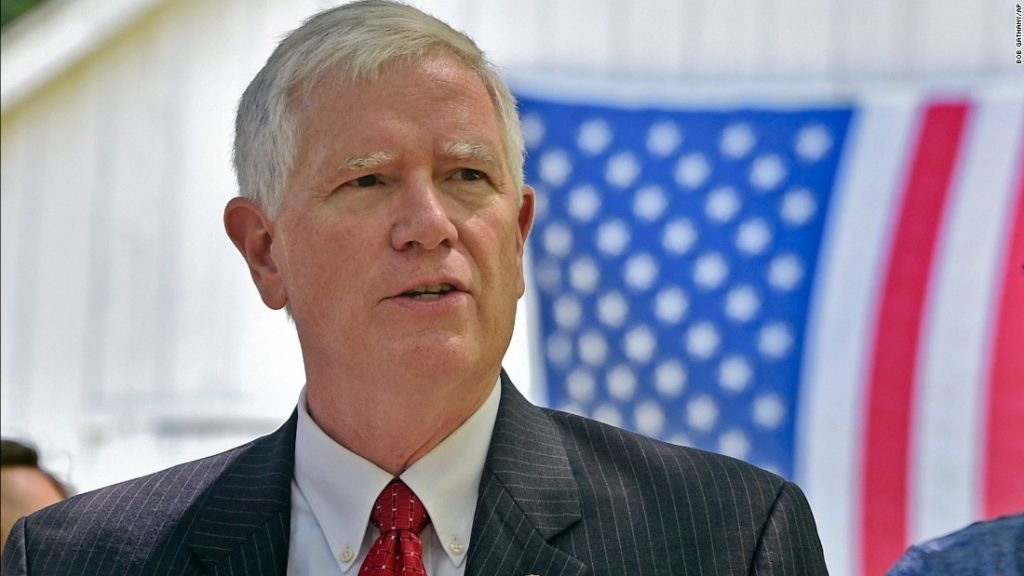
With the government shutdown stretching to nearly a month, Speaker of the House Nancy Pelosi asked President Donald Trump to postpone the upcoming State of the Union address. In a letter to the president on Wednesday, she wrote, Given the security concerns and unless the government re-opens this week, I suggest that we work together to determine another suitable date after government has re-opened for this address or for you to consider delivering your State of the Union address in writing to the Congress on January 29th. Kirstjen Nielsen, Secretary of Homeland Security, took to Twitter to ensure the public that the State of the Union can go ahead as planned. The Department of Homeland Security and the US Secret Service are fully prepared to support and secure the State of the Union. We thank the Service for their mission focus and dedication and for all they do each day to secure our homeland. — Secretary Kirstjen M. Nielsen (@SecNielsen) January 16, 2019 Thursday, Alabama 5th District Rep. Republican Mo Brooks called for President Trump to move the speech from the House to the Senate Chamber in response, In a letter to the president, Vice President Pence, and Senate Majority Leader Mitch McConnell, Brooks called Pelosi’s request “hyper partisan.” He concluded his letter by saying, I most strongly encourage Vice-President Mike Pence, in his Constitutional capacity as the presiding officer of the Senate, and Senate Majority Leader Mitch McConnell, to invite President Trump to report to the American people on the state of the union in the Senate Chamber. While traditionally these addresses have been held in the House Chamber due to its larger size, inasmuch as House Democrats apparently do not want to hear from the President anyway, overcrowding of the Senate chamber should not be an issue. I urge President Trump, Vice-President Pence (as President of the Senate), and Leader McConnell to maintain January 29, 2019 as the date on which President Trump can address the American people from the Senate Chamber, thus putting President Trump with our first president, George Washington, who also gave his first State of the Union address in the Capitol’s Senate Chamber. Brooks also responded to Pelosi on Wednesday, saying she was using the address as a “political bargaining chip.”
GOP dismisses suggestion that State of Union be postponed
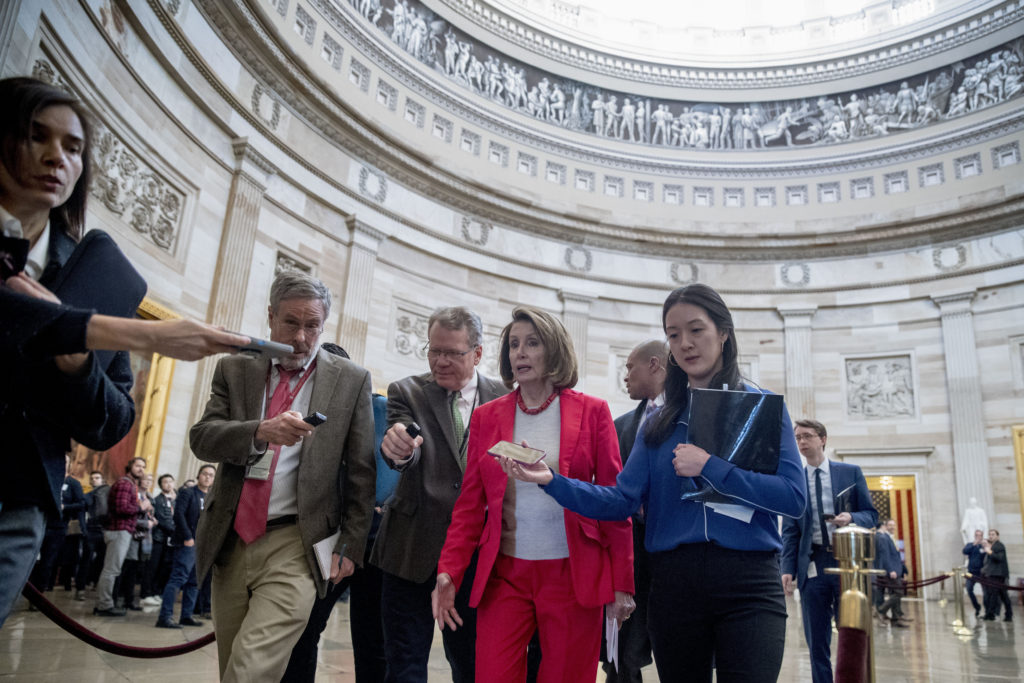
A grand Washington ritual became a potential casualty of the partial government shutdown as House Speaker Nancy Pelosi asked President Donald Trump to postpone his Jan. 29 State of the Union speech. She cited concerns about whether the hobbled government can provide adequate security, but Republicans cast her move as a ploy to deny Trump the stage. In a letter to Trump, Pelosi said that with both the Secret Service and the Homeland Security Department entangled in the shutdown, the president should speak to Congress another time or he should deliver the address in writing. Homeland Security Secretary Kirstjen Nielsen denied anyone’s safety is compromised, saying Wednesday that both agencies “are fully prepared to support and secure the State of the Union.” Trump did not immediately respond to the request, and the White House, thrown off guard by the move, didn’t immediately offer any official response. But GOP allies accused Pelosi of playing politics, with Republican Rep. Steve Scalise tweeting that Democrats are “only interested in obstructing @realDonaldTrump, not governing.” Pelosi, who issued the customary invitation to Trump weeks ago, hit the president in a vulnerable place, as he delights in taking his message to the public and has been preparing for the address for weeks. The uncertainty surrounding the speech also underscored the unraveling of ceremonial norms and niceties in Trump’s Washington, with the shutdown in its fourth week, the White House and Democrats in a stalemate and the impasse draining the finances of hundreds of thousands of federal employees. Pelosi left unclear what would happen if Trump insisted on coming despite the welcome mat being pulled away. It takes a joint resolution of the House and Congress to extend the official invitation and set the stage. “We’ll have to have a security evaluation, but that would mean diverting resources,” she told reporters when asked how she would respond if Trump still intended to come. “I don’t know how that could happen.” Trump stayed quiet on the request throughout the day. During an Oval Office visit, Sen. Rand Paul said they discussed the shutdown but the president did not offer any reaction to Pelosi’s suggestion to put off the speech. Paul suggested on Twitter on Thursday that Trump deliver the address in the Senate, where Republicans hold a majority, which would be an unusual move. “If Mrs. Pelosi refuses to allow the president to deliver the State of the Union in the House, I propose we move it to the Senate and make it happen!” Paul said. Pressure on Trump intensified on Wednesday, the 26th day of the shutdown, as lawmakers from both parties scrambled for solutions. At the White House, Trump met a bipartisan group of lawmakers, as well as a group of Republican senators, but progress appeared elusive. The shutdown, already the longest ever, entered its 27th day Thursday. The previous longest was 21 days in 1995-96, when Bill Clinton was president. While Trump’s own advisers said the shutdown was proving a greater drag on the economy than expected, Trump showed no signs of backing off a fight that he views as vital for his core supporters. On Wednesday, Trump signed legislation into law affirming that the roughly 800,000 federal workers who have been going without pay will ultimately be compensated for their lost wages. That was the practice in the past. As he weighs a response to Pelosi, Trump could not go forward with a State of the Union address in Congress without her blessing. Donald Ritchie, former historian of the Senate, said that anytime a president comes to speak, it must be at the request of Congress. Trump could opt to deliver a speech somewhere else, like the Oval Office, but it would not have the same ritualistic heft. Democratic leaders did not ask the Secret Service if the agency would be able to secure the State of the Union event before sending the letter, according to a senior Homeland Security official, who was not authorized to speak publicly. Pelosi’s office said Congress is already familiar with the percentage of Secret Service and Homeland Security employees who have been furloughed and working without pay. The Secret Service starts preparing for events like these months in advance. Lawmakers struggled to find a way out of the shutdown Wednesday. Trump is demanding $5.7 billion to build a wall along the Mexican border that he says is needed on humanitarian and security grounds. But Pelosi is refusing money for the wall she views as ineffective and immoral, and Democrats say they will discuss border security once the government has reopened. Some expressed little optimism. Sen. Lindsey Graham, a South Carolina Republican who has been working on bipartisan strategies, declared glumly: “I am running out of ideas.” Trump met a bipartisan group of lawmakers Wednesday that included seven Democrats. Two people who attended the White House meeting agreed it was “productive,” but could not say to what extent Trump was listening or moved by the conversation. The people, who spoke on condition of anonymity to discuss the event candidly, said it seemed at some points as if people were talking past each other. Lawmakers talked about the shutdown’s effect on their constituents and advocated for “border security.” Trump and others on-and-off used the term “wall.” It was not clear if progress had been made, by those accounts. Meanwhile a group of Republican senators headed to the White House later Wednesday. Many Republicans were unwilling to sign on to a letter led by Graham and Sen. Chris Coons, D-Del., to reopen the government for three weeks while talks continue. They had been warned off such a strategy by Vice President Mike Pence and White House senior adviser Jared Kushner, who told them Trump opposed such a short-term fix, but the senators pressed on anyway, trying to get 20 Democrats and 20 Republicans to join. While Sen. Susan Collins, R-Maine, said she has signed, others said GOP support was lacking. “They’re a little short on the R side,” said Sen.


